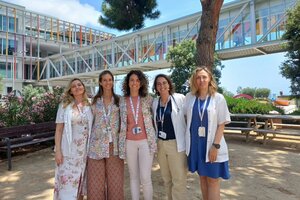A study led by Sant Joan de Déu shows promising results for a new treatment for childhood cerebral adrenoleukodystrophy
An international team of researchers, with prominent leadership from the SJD Barcelona Children’s Hospital (HSJDB) and Institut de Recerca Sant Joan de Déu (IRSJD), has published in Safety and efficacy of leriglitazone in childhood cerebral adrenoleukodystrophy (NEXUS): an interim analysis of an open-label, phase 2/3 trial, presenting interim results of a phase 2/3 clinical trial evaluating the efficacy and safety of leriglitazone, a new oral drug for the treatment of pediatric cerebral adrenoleukodystrophy (cALD), a rare and severely disabling disease.
The study, known as NEXUS and led by Dr. Ángeles García-Cazorla, head of the Metabolic Diseases Unit at HSJDB, head of the Pediatric Neurometabolism research group at IRSJD, and director of the Neurometabolic Diseases Unit and researcher at CIBERER and the European network MetabERN, is the first multicenter trial exploring a pharmacological alternative to current therapeutic options, which are mostly limited to hematopoietic stem cell transplantation-a complex and risky procedure.
Results collected after 24 weeks of treatment with leriglitazone show that all evaluable patients (n=11) remained clinically stable and experienced a slowdown in the growth of brain lesions compared to the natural history of the disease. In 45% of cases, disease progression was halted, based on clinical and neuroimaging criteria. Furthermore, no serious adverse effects related to the treatment were detected.
"Cerebral adrenoleukodystrophy is a devastating disease that, until now, had only very limited and complex therapeutic options. The preliminary results of the NEXUS study offer us, for the first time, clear indications that a pharmacological treatment could safely and early slow the progression of the disease. For now, leriglitazone is not considered a substitute for hematopoietic transplantation or gene therapy, but rather a therapeutic option that can temporarily stabilize the disease and offer a window of opportunity to access a curative treatment when a suitable donor is available," says Dr. García-Cazorla.
Adrenoleukodystrophy
Pediatric adrenoleukodystrophy, also known as childhood cerebral adrenoleukodystrophy (cALD), is a rare and serious genetic disease that primarily affects boys and is part of the group of leukodystrophies-diseases that affect myelin, the substance that coats and protects the brain's nerve fibers.
Since the disease progresses rapidly once brain lesions appear, detecting it before symptoms begin is key. In some countries, it is beginning to be included in newborn screenings (heel prick test) to allow diagnosis at birth.
Minoryx Therapeutics
The NEXUS study, driven by the biotech company Minoryx Therapeutics (also based in Catalonia), plans to complete full patient follow-up over a 96-week period.
Sant Joan de Déu emphasizes the importance of early detection and the development of new therapies that can stop the disease before it causes irreversible neurological damage.

Is the first multicenter trial exploring a pharmacological alternative to current therapeutic options.
